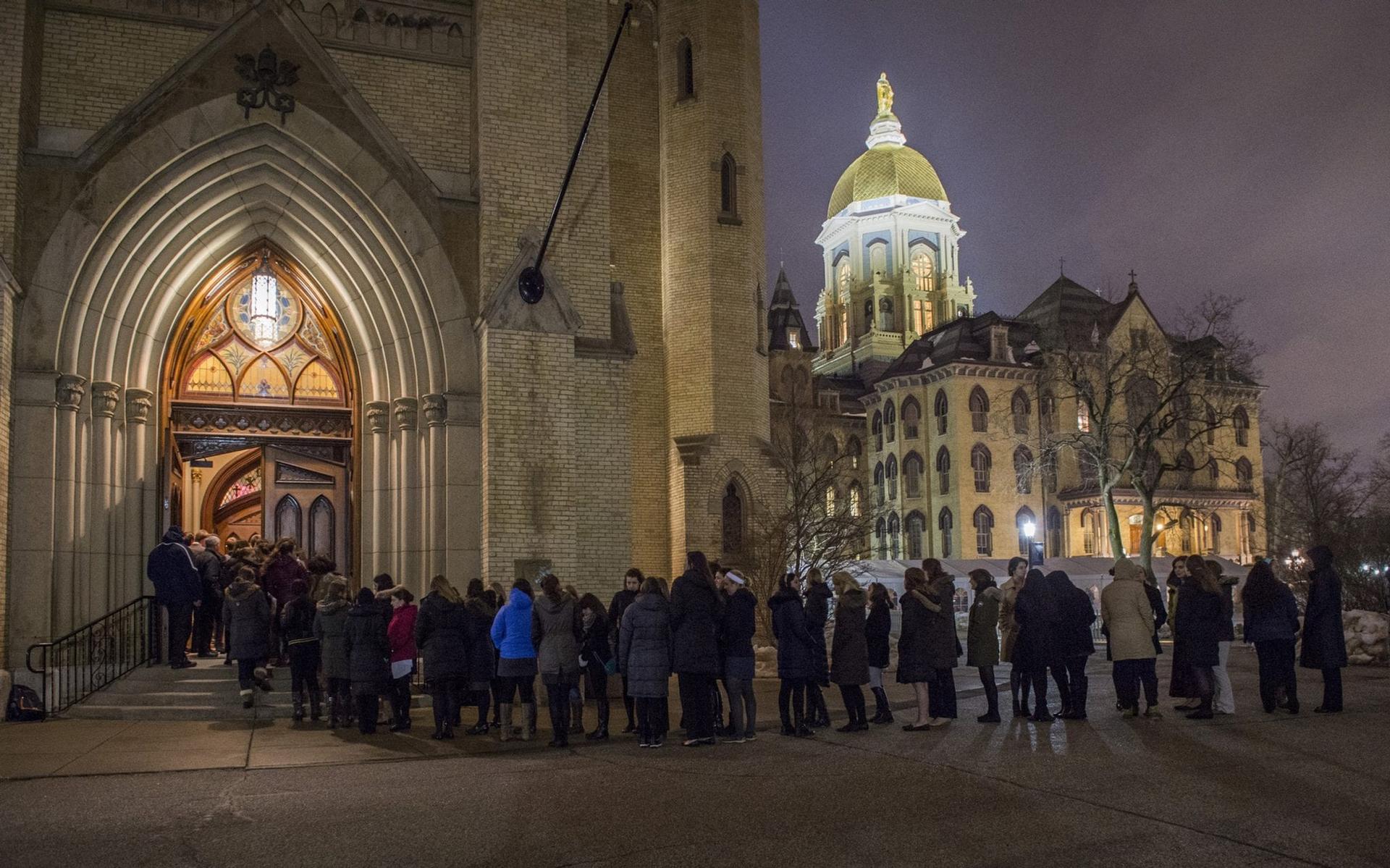NEW YORK – At a time when Pope Francis is asking the global Church to renew its focus on young people, the University of Notre Dame has launched a new digital media platform aimed to do just that.
Unveiled on Sunday on the occasion of the university’s 175th anniversary, the “Grotto Network” will serve as a platform for video storytelling, social media campaigns, and conversation to foster spiritual development, but will also provide practical support to its users, including resources for financial management, career development, health, and wellness.
“For 175 years, the university has sought to educate the minds and inspire the hearts of young people,” said Notre Dame President, Holy Cross Father John Jenkins, in a press release. “Grotto Network is our effort for this time as we — in partnership with many others, but especially local parishes — employ technology with which this generation is conversant, help millennials live richer lives, experience the joy of the Gospel and use their talents in generous service to others.”
 Holy Cross Father Edward Sorin founded Notre Dame when he was only 28 years old, and the university says the Grotto Network follows in that same pioneering tradition of young people creatively engaged in the faith.
Holy Cross Father Edward Sorin founded Notre Dame when he was only 28 years old, and the university says the Grotto Network follows in that same pioneering tradition of young people creatively engaged in the faith.
According to Sarah Yaklic, director of Grotto Network, the vision behind the project was Jenkins’s response to constantly seeing data about young people leaving the faith.
“Notre Dame said let’s see what we can do as an academic institution to walk with the Church and serve young adults who are still searching for meaning but are away from the institutional Church and see what we can do to bring young adults back into parish life and faith communities,” Yaklic told Crux.
According to a 2016 study from the Public Religion Research Institute (PRRI), 39 percent of 18 to 29-year-olds in the United States self-identify as religiously unaffiliated. This population has been categorized as the “nones,” and is part of the intended audience the Grotto Network hopes to reach.
“The target audience that we’re extending our invitation to is Catholic young adults who identify as Catholics but are away from the Church community, so those who may identify with religious belief but are not finding themselves at Sunday Mass,” said Yaklic. “We want to meet them where they are online through moments of inspiration and beauty and hopefully from that invitation build a greater sense of trust.”
When the U.S. Catholic Bishops met in Baltimore earlier this month for their annual fall assembly, Bishop Robert Barron, auxiliary bishop of Los Angeles, said that his chief focus as head of the United States Conference of Catholic Bishops’ Committee on Evangelization and Catechesis will be on reaching the “nones.”
Daniel Cox, PRRI’s director of research, told Crux that the task of reaching the “nones” presents a different type of challenge, largely unfamiliar to past generations of religious believers.
“There are a number of people raised outside of religious institutions,” said Cox. “They’re much less likely to participate in religious activities whether it’s inside or outside of the home…and their formative religious experiences are much less robust so that when they reach adulthood they don’t have as strong of a connection to religion or religious institutions.”
“We often talk about it as coming back or regaining their trust, but a lot of them were never that involved or committed in the first place,” he added.
In October 2018, Pope Francis will convene a Synod of Bishops around the theme of young people, the faith, and vocational discernment to further address this crisis in a direct way. In preparation for the Synod, this past June the Vatican launched an interactive online survey “to better understand the lives, attitudes and concerns of 16- to 29-year-olds around the world.”
While the results from the Vatican survey are still pending, Cox told Crux that his research has shown that it’s not necessarily personal experiences within churches that are driving young people away, but belief in general.
“It’s not that they don’t necessarily like the services they’re attending or that they’re boring,” said Cox, “a lot of them just don’t believe in religious teachings anymore.”
Despite the uphill battle, Yaklic says her team is hoping Synod will provide new momentum in this area.
“While the dream of the Grotto Network was born before the announcement of the Synod, I think it just shows how the Holy Spirit is working and is alive in our Church and saying we really do need to pay attention to the needs and lives of young people within the faith community,” said Yaklic.
Cox told Crux that he believes initiatives like the Grotto Network are an interesting project and that there will likely be similar efforts as other religious institutions aim to reach this population, but he believes on the whole the project will be “a heavy lift.”
For Yaklic, however, that “heavy lift” is why such efforts are all the more necessary.
“Pope Francis has so frequently spoken about the ‘field hospital’ and the Church’s invitation to go out and bring a message of the Lord’s mercy. The team at the Grotto Network really does see the digital highways as one of those places that is the field hospital — full of young adults that are in search of meaning,” said Yaklic.
“We just hope that as we aim to bring stories of beauty and inspiration that we’ll be journeying and accompanying them on the digital highways and bringing them into a closer encounter to our Lord.”















